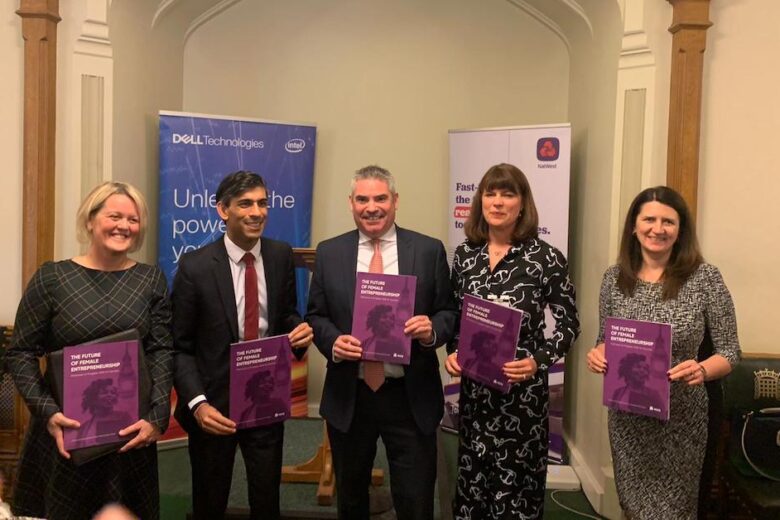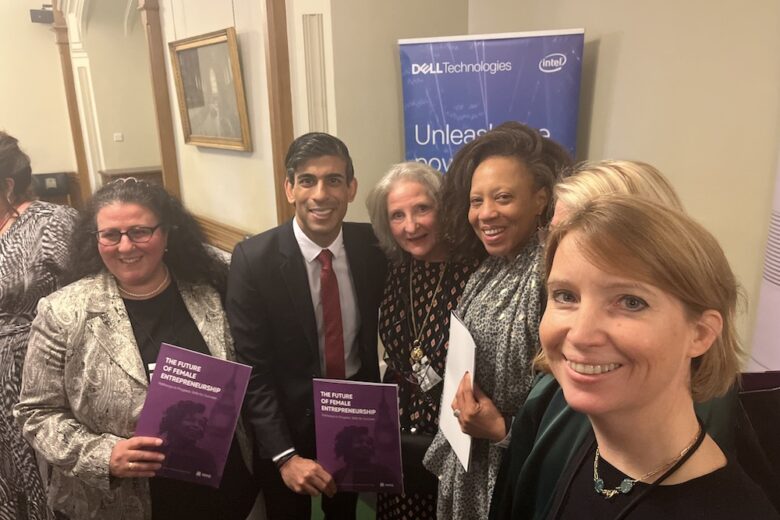Why female entrepreneurs in the UK need help – and what the government needs to do about it
Find out why female entrepreneurship in the UK is in desperate need of help – and what a new report from the Women and Enterprise APPG recommends the government do about it.
When I fell pregnant with my daughter 13 years ago I made the decision to stop freelancing in London and work for clients from home. At that time I didn’t have many local friends, so started getting to know women in my town.
The women I met were brilliant. They were well educated, intelligent, well travelled and had enjoyed successful careers. They were capable and ambitious… but all of them were struggling to find something meaningful and rewarding to do once they had children.
With the concept of remote work still many years away, they found that, post-children, they couldn’t make their former careers work. They could no longer work the hours their role required and few companies were prepared to discuss making a flexible arrangement work.
As a result, many were reluctantly applying for local part-time jobs that didn’t use their skills and experience, didn’t challenge or excite them, and didn’t pay the salary their level of skill and experience deserved.
I thought this was wrong, but at the time there was nothing that said the situation should or could be any different. There were no websites inspiring or helping these women fight for the flexible career they wanted, or use their skills to go freelance or start a business.
So in April 2013 I launched Talented Ladies Club to do just that.
In the years since the world has moved on considerably, and today the prospects for ambitious working mothers are much brighter. Not perfect, still, but miles ahead of where we were in 2008. However, it appears we still have a significant amount of work to do on female entrepreneurship.
The UK has one of the lowest rates of female entrepreneurship
For the past few years, as well as running Talented Ladies Club, I have been a member of two All Party Parliamentary Groups: the Women and Work APPG and Women and Enterprise APPG. And in the latter APPG I am a member of a sub-group focusing on business coaching and mentoring.
Over the past few years we’ve been exploring the barriers women face in starting and growing businesses, and what solutions could be put in place to help them. This work has culminated in a brand new report: The Future of Female Entrepreneurs.
Female entrepreneurship in the UK desperately needs help. Did you know that the rate of entrepreneurial activity for women in the UK is only 5.4% – less than half the rate for men? The UK – shockingly – has one of the lowest rates of female entrepreneurship in the developed world. Women-led businesses also receive far less venture capital funding than men (in 2020 they received just 2.3%).
As a result, the UK Treasury commissioned Alison Rose to lead an independent review of female entrepreneurship. The Alison Rose Review of Female Entrepreneurship, which was published in 2019, shed renewed light on the difficulties faced by women starting and growing businesses and identified ways of unlocking this untapped talent.
This is the “economically necessary thing to do”
Two years on from Alison Rose’s review, the The Future of Female Entrepreneurs explores the impact of the COVID-19 pandemic on female entrepreneurship, and what needs to be done to improve education and skills. It concludes with 10 key recommendations for the government and three for the private sector.
The report was officially launched on 8 December at an event at the House of Commons, hosted by Craig Tracey, MP for North Warwickshire and Chair of the APPG, and attended by Alison Rose, author of the aforementioned Alison Rose Review of Female Entrepreneurship, and chief executive of NatWest Group since November 2019 (she is the first woman to lead a major UK lender), Dayne Turbitt, SVP & GM for Dell Technologies in the UK, and Rishi Sunak, Chancellor of the Exchequer.
At the event, Rishi Sunak confirmed his support for the report and female entrepreneurship, stating:
“I want this country to be known around the world where the most accomplished ideas develop the most exciting technology and turn those into the most innovative high growth businesses and that should be true regardless of gender.
“We are never going to achieve our vision if we are missing out on the talent, creativity and hard work of half our country’s population.
“This isn’t just the right thing to do, it is the economic necessary thing to do.”
The Chancellor also referenced Alison Rose’s review, stating that if women started and scaled new businesses at the same rate as men, as much as £250 billion of extra value could be added to the UK economy. It’s a sentiment that we also highlighted in a video four years ago:
Recommendations for government
So what can be done to help encourage and support women in business? The The Future of Female Entrepreneurs repot makes 10 recommendations to the government:
- The Government should review the role of applied learning across the curriculum, and that this should specifically include enterprise.
- Government should work to develop enterprising activities and opportunities in education from a younger age, so that children are able to experience them in primary school.
- As we expand access to careers guidance and enterprise education, this should include content that is specifically tailored to support girls, to address their systematic underrepresentation among entrepreneurs.
- To address the lack of data on business engagement, LEPs and local chambers of commerce should work together to develop data on the proportion of businesses in their area who are engaging with schools.
- The Government should support LEPs and schools by working with stakeholders to develop a guide for Careers Leaders and school leaders on how to best utilise their LEPs in schools.
- The Government should set out how the UK Shared Prosperity Fund will support entrepreneurship and business creation through education institutions as well as direct investment in economic development.
- Government should develop regional business hubs throughout the UK, modelled on US Women’s Business Centres.
- We recommend that the Government embeds careers training as part of the education of teachers, including as part of both initial teacher training and continuing professional development.
- The Government and Careers and Enterprise Company should carry out an impact assessment of the previous bursaries programme, and look to expand it if it had a positive impact.
- The Government should amend the Gatsby benchmarks to include a requirement to expose pupils to entrepreneurship and entrepreneurs, as well as other routes through education and into work.
Recommendations for the private sector
It also makes three recommendations for the private sector:
- When working with schools to embed entrepreneurship, businesses and entrepreneurs should offer female mentors and role models to support girls in understanding entrepreneurship as an option after their education.
- To address the lack of data on business engagement, LEPs and local chambers of commerce should work together to develop data on the proportion of businesses in their area who are engaging with schools.
- Entrepreneurs and organisations that support them, should take a role in supporting teachers to deliver entrepreneurial education, visiting schools and providing a practical perspective on the support that children will need.
The UK (and world) needs more female entrepreneurs
As a female business owner myself I know the struggles and joys of entrepreneurship, and I know how much time, money, freedom and opportunity it has given me and my family. It also enables me to contribute to society by generating revenue, hiring freelancers, using business services and donating to charities every month.
It also allows me to continue to share inspiring content and advice to help women (and men), and show other women that they too can start their own businesses.
As the statistics in the video I shared above show, the world is a better place when women start businesses, and I hope that some (or ideally all) of the recommendations shared by the report are taken seriously and acted upon, so the generations that come after us live in a world where women are as supported and encouraged in entrepreneurship as men.
Download and read The Future of Female Entrepreneurs.





